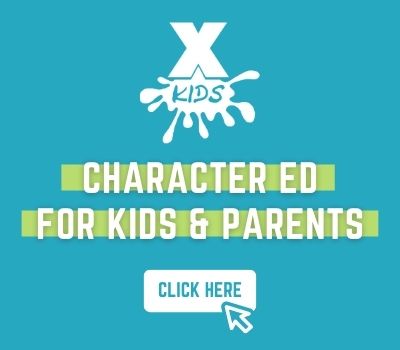Courage | Core Virtues for Kids #2
Having courage isn’t just about doing crazy stuff that seems brave. It’s about a whole lot more.
Talking Points:
- Courage is about facing your fears even when you want to run, and there are plenty of things that might make us want to run.
- Making friends when you don’t know a lot of people – like if you move to a new town – can take courage.
- Standing up for what’s right, like protecting someone being picked on, or telling the truth when it would be easier to hide or to mind your own business, takes courage.
Discussion:
- Initial reactions to this topic? What jumped out at you?
- What are some things that make you want to run away? Scary movies, bugs, homework?
- Has someone you know ever shown a lot of courage? What happened?
- What are times when you have had courage instead of running? Tell the story!
- Is there anything you need to have courage in right now? Why does it take courage?
- Why do you think the world would be a better place if everyone had courage?
- Is there a step you need to take based on today’s topic?
What if You Never Ate Fruits and Vegetables?
It’s fine to not like some foods. You probably didn’t like veggies as a kid. But what if you never ate fruits and veggies?
Talking Points:
- Fruits and vegetables contain a lot of essential vitamins and minerals your body needs to stay healthy. These include vitamins A, B, C, folic acid, potassium, magnesium, and antioxidants.
- What would happen if you cut out all fruits and vegetables? First, your hair would become dried and frayed, your vision would worsen, and you might even lose nighttime vision.
- Your digestive system would go haywire! You’d feel pretty sick all the time.
- Your immune system would have a bad time, too, and without it guarding you from disease, you’d likely get sick a lot.
- The nutrients in fruits and vegetables help your body fight and prevent long-term diseases like cancer. Without them, you can look older and be at a higher risk for other conditions.
Discussion:
- Initial reactions to this topic? What jumped out at you?
- What’s your favorite snack that isn’t a fruit or vegetable?
- What are some of your favorite fruits and vegetables? What are some that you don’t like? Why?
- Does your family have a history of certain diseases or conditions? Or do you have a special medical issue? Explain.
- What steps should you take to eat healthier?
- Is there a step you need to take based on today’s topic?
Wisdom Isn’t Just for Old People
Wisdom isn’t just for grandmas and grandpas. Here’s how to be a wise kid.
Talking Points:
- Being wise and being smart aren’t the same thing. When you are smart, you might know a lot of things, but only wise people know how to put that knowledge to good use.
- Anyone can be wise; wisdom isn’t just for old people. Wisdom is knowing what’s right and acting on it.
- One example of wisdom is knowing that vegetables are good for you, so you eat them. Another is knowing that bullying is bad, so you don’t do it.
Discussion:
- Initial reactions to this topic? What jumped out at you?
- Who is a really smart person you know? How are they smart?
- Who is a really wise person you know? How are they wise?
- What is the difference between being smart and being wise?
- Why is being wise important?
- What are some examples of being wise in your life?
- Is there a step you need to take based on today’s topic?
Patience | Core Virtues for Kids #1
Patience is all about the way you think and act, even when you are annoyed.
Talking Points:
- When you are patient with other people you try your best to understand them and listen to them before you talk.
- Sometimes it’s hard to be patient with people that annoy you. The best way to be patient with them is to make sure you are thinking before you say things to them or respond to them when they are bothering you.
- A great way to stay patient when you are getting annoyed is by taking a deep breath and counting to ten before you do anything.
Discussion:
- Initial reactions to this topic? What jumped out at you?
- Who is someone that makes you impatient? Why?
- Why do you think it’s hard to be patient when people are bothering you?
- Why is patience so important?
- Can you think of someone who is really patient? Why do you think they are so patient?
- Is there a step you need to take based on today’s topic?
Energy Bus for Kids
Fifth grader Catherine Fultz summarizes the kid’s book, The Energy Bus, and explains how kids can have positive energy.
Talking Points:
- Create a positive vision. Start each day thinking it’s going to be a great day!
- Fuel your ride with positive energy. Smile and laugh and that will fill you up with positive energy to attack your goals.
- No bullies allowed. Choose to spend time with friends who make you feel good about yourself.
- Love your passengers. Show kindness and respect to others.
- Enjoy the ride. Enjoy life and bring joy to others.
Discussion:
- Initial reactions to this topic? What jumped out at you?
- Describe positive energy in your own words.
- How can simply picturing a great day or night actually make it to happen? How can imagining yourself succeeding make you feel more positive about yourself?
- What negative thoughts or feelings do you have throughout the day? How does that make you feel and affect the people around you? What positive thoughts or feelings do you have throughout the day? How does that make you feel and affect the people around you?
- Describe a time you’ve been bullied? How have you maybe bullied someone else?
- How are you kind to others besides your close friends at school? How are you helpful to your parents at home?
- What can you wear or do to remind yourself to be positive and to share that energy with others every day?
- Is there a step you need to take based on today’s topic?
Self-Control for Kids
You can go ahead and punch yourself in the face if you want. Or you can use a little self-control.
Talking Points:
- Self-control is all about controlling your own actions and not just doing whatever you want.
- You can have self-control by being nice to your brothers and sisters or by being careful what you eat.
- If you get really frustrated or annoyed, try taking a time out.
Discussion:
- Initial reactions to this topic? What jumped out at you?
- Have you ever lost control? What happened?
- If you have ever lost your temper, how did that help you? Did it hurt you or someone else?
- Does it matter to control what you eat? Why?
- How can having good self-control help you? Give one example.
- How can having poor self-control harm you? Give one example.
- Is there a step you need to take based on today’s topic?
Five Things about Bullies
Where Kidforward talks about bullies and how they're just normal kids after all.
Talking Points:
- Bullies are stupid. Wait a second, that’s not very nice.
- Bullies are dumb. Oops, I did it again!
- Bullies bully to feel strong. They’re just kids, and they probably don’t feel very big in their world.
- Bullies bully to feel cool. They sometimes do it just to get attention.
- Bullies bully to feel better about themselves. Deep down inside, bullies are insecure people.
Discussion:
- Initial reactions to this topic? What jumped out at you?
- List the five things about bullies. Which one makes the most sense to you?
- Who are the bullies at your school? Why do you think they bully?
- If you could say anything to a bully, what would you say? Why don’t you say it?
- We learned 5 thing about bullies. What can you add to the list?
- Is there a step you need to take based on today’s topic?
Be Like Spieth
At the 2016 Masters the whole world got to see Jordan's character, and he proved that real winners are good losers.
Talking Points:
- Jordan never gave up. Most people – young or old – would have given up after a quadruple bogey. But Jordan didn’t. He kept trying, and he made some great shots to try to come back.
- He wasn’t a sore loser! When he put the green jacket on the winner, he did it with a smile.
Discussion:
- Initial reactions to this topic? What jumped out at you?
- What’s the biggest loss you’ve ever had in sports or in life? How did you react?
- How do our parents want us to act when bad things happen to us?
- Do you think you would have given up if you were in Jordan’s shoes? Why do you think he didn’t give up?
- Describe how a sore loser acts. What did Jordan do to prove he wasn’t a sore loser?
- How can we have the strength to act like Jordan did when bad things happen?
- Is there a step you need to take based on today’s topic?




